














of Trade and Industry, Alan Kyerematen has called for a new plan to restore the country towards growth and transformational path as well as breaking away from the International Monetary Fund (IMF).
The International Monetary Fund (IMF) is poised to lend Ghana $3 billion as the African nation grapples with its worst economic crisis in a generation.
Ghana's determination not to seek the fund's help for a 17th time crumbled in July after soaring in ation spurred widespread street protests.
According to Mr. Kyerematen, who addressed the nation last week and announced his intentions to run for
position when it is opened, said “To avoid going back to the IMF, we need a new Plan. A Plan that will lead us to a more self-reliant and resilient economy. That Plan must move Ghana from Stability and Growth to Transformation.”
Further Mr.Kyerematen indicated that when he gets the nod from his party and ultimately wins power, he will launch and lead the execution of the Great Transformational Plan (GTP) of Ghana which will span the period 2025 to 2030.
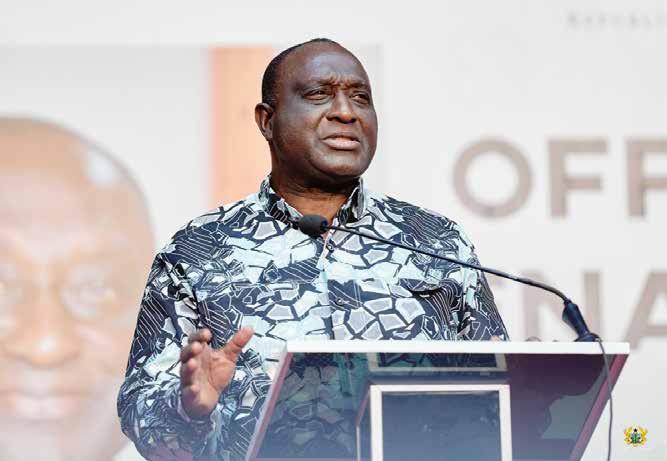
The Post-COVID Economic Recovery Programme (P-CERP) currently being implemented with the anticipated support from the IMF from 2023 to 2025, will be a transitional economic programme leading to the roll out of this Great Transformational Plan.
He proposed seven critical consid-

erations would need to be taken into account to guarantee the success of the plan; rst he stated that the primacy of the Private Sector in the country’s national development agenda. The Private Sector, both domestic and foreign, formal and informal has to be at the centre of our transformational agenda. The Government’s focus must be to facilitate the process of making our private sector competitive, by creating an enabling environment for businesses.
Attitude to work and enforcement of discipline, Corruption and petty theft or thievery, particularly from the public purse, deny our country the bene t of utilizing its tax revenue and other resources for the development of our country, The arrogance of power has been a major obstruction to progress in our country, Passion for excellence. As a country we must celebrate competence and excellence and not mediocrity.
Further, he discussed that as a people, focus should be more on getting things done than talking and politics in Ghana is too divisive.
A sta level agreement has been reached with the IMF but the executive board will approve the $3 billion loan package only if Ghana undergoes a comprehensive debt restructuring.
Ghana's debt reached 467.3 billion cedis ($43.5 billion) in September.
The country’s consumer in ation rose to 54.1% year-on-year in December, up from 50.3% the previous month and its highest level in 22 years, driven by fuel, utilities and food, the statistics o ce has announced this month.
Bloomberg reported Apple planned to make its own displays for mobile devices beginning in 2024, as part of a move to bring more of its components in-house to cut reliance on suppliers including Samsung and LG Electronics.

The news outlet stated Apple planned to switch the displays on its premium Watch model by the end of 2024 with displays for other devices to follow.
Apple plans to upgrade current OLEDs to its own micro-LEDs.
Making its own screens would follow Apple’s ongoing e ort to develop its own components to avoid supply chain constraints and have more direct control over its designs: it previously dropped Intel chips in favour of its own M1 and M2 silicon in Mac computers.
Apple has also spent several years developing its own 5G modem for iPhones to reduce its reliance on Qualcomm after buying the majority of Intel’s related business in 2019.
Earlier this week, Bloomberg reported Apple plans to replace Broadcom’s Wi-Fi and Bluetooth component by the end of 2024 or early 2025.
Source – MobileWorld

to the Covid-19 pandemic.
During his talks, he also emphasized China's partnership with Africa in security and economic development. Gang rejected the idea that China is competing in Africa with the United States, which last month sought to reassert its in uence with a U.S.-Africa summit in Washington.
Instead, he underlined that what Africa needs is solidarity and cooperation, not block competition. China has invested heavily in infrastructure in African countries, including roads, railways and hospitals.
with Ethiopian Prime Minister Abiy Ahmed and other government o cials, and announced a partial cancellation of Ethiopia's debt to China during the visit, though neither side provided details. Ethiopia has borrowed $13.7 billion from China since 2000 and has been seeking to restructure its debt to foreign lenders since 2021.
Ethiopia is a key Chinese ally, partly due to its geopolitical signi cance in the Horn of Africa since the country is the seat of the African Union. It is also strategic for China as it seeks to expand its multibillion-dollar Belt and Road Initiative.
to Africa. Without mincing words, this choice has multiple geopolitical implications and signi cance for further strengthening relations between China and Africa.
In fact, details are not needed here, but readers could guess and imagine what these mean to both China and Africa. At a glance, Minister Qin Gang was in Addis Ababa, the East African city and the capital of Ethiopia, the headquarters of the continental organization popularly referred to as African Union.
According to various reports, the Chinese Foreign Minister held discussions with African Union Commission Chairperson Moussa Faki Mahamat. The bilateral talks are related to various strategic development issues in which China largely plays appreciable roles for the bene t of Africa and its people.
There is no need listing all the development questions here, but one important point is that Qin Gang's visit was principally connected to ribbon cutting ceremony marking the completion of the newly constructed buildingthe African Centre for Disease Control and Prevention (Africa CDC) headquarters in Addis Ababa.
The building is one of the best-equipped centres for disease control in Africa, allowing Africa CDC to play its role as the technical
ship with the national public health institutes and ministries of health in African countries.
Located in the African Village, south of Addis Ababa, the new site covers an area of 90,000 m2 with a total construction area of nearly 40,000 m2. It includes an emergency operation centre, a data centre, laboratory, resource centre, brie ng rooms, training centre, conference centre, o ces, and expatriate apartments, - all constructed, furnished and equipped by the Government of China.
Ethiopia is part of a week-long tour of the continent, and was joined by Moussa Faki Mahamat, at the opening of the $80 million headquarters, which also built and equipped by China. Worth noting here that it nanced this complex's construction, as it previously did for the headquarters of the AU itself, also based in the Ethiopian capital.
According to Gang the project was a testament to the growing relations between his country and Africa - is seen as the latest example of China's increasing investment on the continent. Beijing accelerated its involvement to tackle health crises after the Ebola outbreak in West Africa in 2014. Four years later, it announced its plan to build the Africa CDC headquarters. The agency led the continent's response
In his contribution, AUC Chairman Moussa Faki Mahamat told a joint press conference that Africa's lack of permanent representation on the Security Council is a "burning issue" considering that most issues on the council agenda are related to African countries. China is one of the council's ve permanent members.
In fact, the Security Council is made up of fteen members, ve of whom are permanent and have veto-wielding power: the United States, Russia, China, France, and Britain. The other ten positions are lled by other countries for two-year stints, ve of which are announced each year.
"It is unacceptable that others decide in the place of others. It is not fair. We need a new order at the international level which will respect the interests of others," he said.
Moussa Mahamat underlined the fact that "Africa refuses to be considered to be an arena of exchange of in uence. ...We are open to cooperation and partnership with everybody, but our principles, our priorities and our interests have to be respected. The partnership we have with China is based on these principles."
While in Addis Ababa, Gang also met
Beijing was willing to expand bilateral cooperation in various elds and would "encourage more Chinese companies to invest in Ethiopia and participate in the reconstruction process", he said, according to a Chinese foreign ministry readout.
According to the Chinese Loans to Africa Database at Boston University's Global Development Policy Centre, China pledged US$13.7 billion in loans to Ethiopia between 2000 and 2020 that have gone into building roads, power dams and railways.
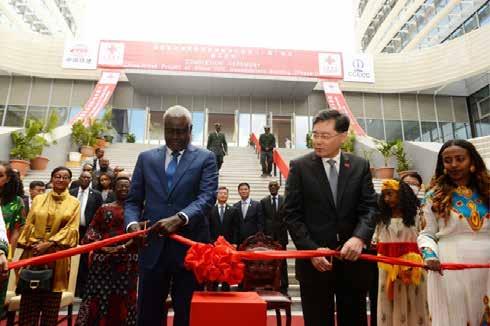
He will also visit Gabon, Angola, Benin and Egypt. Reports indicated that China has strong security ties to Egypt and Angola. Visiting Benin and Gabon shows ambitions to expand Beijing's Belt and Roads infrastructure - building drive – long focused mainly on the Indian Ocean region –into western Africa.
Qin Gang now 56, who was appointed in December, is on his rst overseas visit as foreign minister and started a week-long trip to Africa. The new foreign minister is following in the footsteps of his predecessors, who have for more than three decades started each year with a trip to Africa. It shows that China attaches great importance to the traditional friendship with Africa and the development of China-Africa relations.
The President of the Ghanaian-Diaspora Nurses Alliance (G-DNA), Prof. Yvonne Commodore Mensah, has called for the training of specialized nurses in order to boost healthcare needs of the citizens and also advance the
 By Eugene Davis
By Eugene Davis
profession in the country.
Available data shows the nurse-patient ratio currently in Ghana is 1:18, which means that at any point in time, one nurse is attending to
approximately 18 patients.
This statistic presents the need for the training of more nurses especially in diverse elds, it is to this end that the Ghanaian-Diaspora Nurses Alliance(G-DNA), a non-pro t organization looking to advance the course of nursing in the country has been launched.
Speaking to journalists at the launch of G-DNA at the University of Ghana, Legon in Accra last Friday, Prof. Commodore Mensah said “we hope to connect all Ghanaian nurses wherever they are -nurses who have Ghana in their DNA-- to come back home to advance nursing and healthcare in Ghana.
In Ghana, we have made a lot of progress in training more nurses but the progress that we have made in training basic nurses has not translated in progress in training specialty nurses, so we need nurses who are trained in diverse specialty areas such as cardiology, diabetes, infectious diseases, cancer and we need this specialized training to
meet the healthcare needs of Ghanaians. So, we know that a lot of chronic conditions are now more common such as hypertension, kidney disease, diabetes so we need to make sure that the nurses that we have in Ghana have the adequate level of specialization and training to be able to care for these patients.”
She indicated that the initiative has some prospects for nursing in the country, she said “At this stage we are at the process of listening and learning and understanding the unique challenges nurses in Ghana face and that is why we have breakout groups as part of the launch today -to hear from the nurses and we will take this information and analyse some of the feedback we have received to use this information to design programmes, webinars, conferences, seminars and some of those things will be o ered in person, virtual so if there are nurses in the diaspora who have training in di erent areas they can still contribute to this mission and
help to teach their fellow Ghanaian nurses in these di erent areas as well.”
The Director General of Ghana Health Service, Dr. Patrick Kuma Aboagye conceded that there was the need to beef up the number of professional nurses in the country.
“Nurses leaving the country to Europe and other parts of the world, they are taking mainly the professional nurses and so there is the need for us to beef up the number of professional nurses, so what we are doing is rst to ensure that we expand the study leave for the auxiliary nurses so that in the next two to three years they can become professional nurses and also beef up the quality of nursing and healthcare in the country.
We have also established a system where we are looking around to do an assessment to see the real impact -what has been the real numbers that have left, we are also ensuring that for those who have gone to
study and have certi cates and are professional nurses, we assess and upgrade them, so we can balance of the proportion of auxiliary – professional nurses; because we need more professional nurses to ensure that services are done well.”
Prof. Lydia Aziato, Vice Chancellor of the University of Health and Allied Sciences who was the keynote speaker at the event stated that there are limited opportunities for specialized training, funding for education and other capacity-building opportunities for nurses and midwives in Ghana, which compound their service delivery.
“Although we have made signi cant strides in increasing the number of schools of nursing and midwifery both in public and private institutions in the last decade, more work is still needed especially in the area of specialization.”
The G-DNA is global intervention to advance healthcare delivery by encouraging Ghanaian nurses abroad to contribute to advance nursing and midwifery education and practice in Ghana.
Ghana Airlines, a new national carrier is expected to begin operating in the third quarter of 2023. This is after the government of Ghana awarded Ashanti Airlines, and its operational and nancial Partners the Zotus Group the tender to operate Ghana Airlines out of Accra. The airline has also obtained its air carrier licence and is in the nal stages of obtaining the air operator certi cate.
Ashanti Airlines was shortlisted among others through a competitive process and subsequently
received Cabinet approval for the Strategic Partnership on February 24, 2022.
"Ghana Airlines, funded by UK-based investment fund Zotus Group will commence ights in 2023 with several domestic & regional routes with global and European routes, including London Heathrow and New York (USA) to follow shortly thereafter," the partners said in a statement.

The Zotus Group was co-founded by former England footballer Emile Heskey and Davison Simango.
Integrated marketing communictions company, Global Media Alliance, has launched the 7th edition of Ghana Beverage Awards (GBA) 2022 in Accra, thereby, paving way for the nominations period from 13th of January to 26th of February 2023.
Held at the Silverbird Cinemas, the launch brought together patrons, stakeholders and relevant players in the Ghanaian beverage industry.
Over the years, the awards scheme in accordance with its theme ‘Inspiring Excellence in Ghana’s Beverage Industry,” has contributed signi cantly to spotlighting compelling beverage brands within the local beverage industry. In addi-
tion, it has contributed greatly to the advancement of knowledge and the adoption of modern technology amongst industry players by ensuring that they continually equip themselves with knowledge of the latest beverage production trends while complying with the highest standards of production.
Birthed on the back of the See Ghana, Eat Ghana, Wear Ghana & Drink Ghana Campaign, the Scheme has over the years not only supported the e orts of government in promoting the local beverage industry but has gradually gained traction among relevant stakeholders and has grown to become the reference point for identifying
The statement added that Heskey will lead a credible Board of Direc tors along with aviation start-up supremo Hitesh Patel, business development expert Davison Siman go and well-known Public Relations Director, Alex Rayner.
The airline is currently recruiting for a number of C-suite roles to drive the airline forward.
Heskey said: “There is a lot of work on-going already to get the airline ready for start-up, we are in the market sourcing aircraft to start our operations with a signi cant focus on cargo and passenger manifest from the British Government. It is with this support we anticipate a successful business model from the outset.”
beverage companies who are in touch with the ever-changing needs of consumers.
Speaking at the launch, Chief Executive O cer for Global Media Alliance, Ernest Boateng lauded players in the beverage industry for their contribution to the growth of the nation’s economy.
“For many years, our beverage industry has played a signi cant role in contributing to the overall development of the Ghanaian economy. Additionally, beverages have been a source of joy during festivities held in Ghana, especially during the December period when most concerts and events were held.
It is thus imperative that we recognize and reward the hard work in the industry through avenues such as the Ghana Beverage Awards. We hope the recognition will continue to spur players in the industry to exude more excellence,” Mr. Boateng stated.
He further encouraged the public and beverage industry players
actively contribute to celebrating excellence in the industry by partaking actively in the nominations.
As part of e orts to build excitement ahead of the awards night, Global Media Alliance will organize the rst-ever Beverage Industry Forum on the theme “Strengthening the Presence of the Ghanaian Beverage Industry on the Global Market.” This event will provide the opportunity for thought-provoking conversations on relevant issues geared toward the growth and advancement of the Ghanaian beverage industry.
Conversations at the forum would evolve around the themes of local certi cation and global standardization, consumer in uence, and market dynamics, leveraging opportunities presented by the African Continental Free Trade Area to ensure maximum success on international markets, among others.
GBA 2022 would also feature two new categories -the Beverage Campaign of the Year and the Indigenous
Beverage Brand of the Year to honour deserving beverage companies for their innovation and creativity in the crafting of unique marketing campaigns which have in uenced consumer behavior signi cantly and to highlight the transformation which our indigenous beverages have undergone.
GBA is proudly supported by the Food and Beverage Association of Ghana (FABAG), Consumer Protection Agency (CPA), Food Research Institute (FRI) under CSIR, Silverbird Cinemas, Perception Management International (PMI), Ministry of Trade and Industry, Ministry of Tourism, Arts & Culture and the Ghana Tourism Authority (GTA). It is partnered by Happy FM, Citi FM, YFM, Neesim FM Bolga, Neesim FM Tamale, nydjlive.com, Ghanaweb, eTV Ghana, Business and Financial Times and Daily Guide on the media front.
-END-
Fidelity Bank Ghana has launched a ve-year plan to promote gender inclusion in accessing nancial services.
The Gender Action Plan is aimed at positioning the bank as the benchmark for gender-inclusive banking in the country.
Consequently, the bank, in partnership with AfricInvest and BIO Invest, has engaged Value for Women, a specialised advisory rm that works with organisations globally to advance gender equity, to develop a ve-year Gender Action Plan that translates the bank’s commitment into action.
A release issued in Accra yesterday said: “Through this commitment, Fidelity Bank will enhance product and service design to ensure that it meets the nancial and non- nancial needs of women and men in
“Beyond that, the bank will consciously ensure equitable representation of men and women across all levels within the organisa-
tion.”
The Managing Director of Fidelity Bank, Julian Opuni, explained in the release: "As a responsible bank, we believe that gender inclusion is integral in building sustainable businesses and equitable economies. Over the years, Fidelity Bank has supported businesses, especially small and medium-sized enterprises (SMEs) to be run by both men and women.
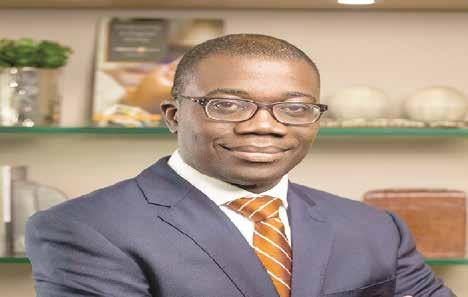
“This ve-year plan we are adopting, however, will be a game changer for the bank and contribute signi cantly to our e orts as a country in achieving the Sustainable Development Goals (SDGs), especially SDG5 on Gender Equality."
Mr Opuni said the action plan was developed following a holistic 360-degree gender diagnostic process in assessing the current state of gender inclusion at Fidelity Bank and opportunities for improving practices, as well as a series of collaborative workshops with senior and executive management.
"I am con dent that this initiative has the potential to be a key di erentiating factor for our bank, positioning us as a gender-inclusive bank for both employees and customers while boosting our business performance," he added.
Gender inclusion
Co-Founder and CEO at Value for Women, Rebecca Fries, said, “It has been an inspiring experience to work with Fidelity Bank Ghana as it embarks on its journey towards greater gender inclusion.”
It was clear from the beginning that the bank has strong ambitions on this front, and through visionary leadership, it is striving to set an example for gender-inclusive practices in the nancial services industry.
She said the gender action plan documented a holistic vision to support women as leaders, entrepreneurs and employees along with ensuring the bank provided a workplace that allowed all sta to grow and thrive.
“We look forward to supporting the bank in the coming ve years as they continue to implement these strategies,” she said.
The Social Security and National Insurance Trust (SSNIT) has increased monthly pension payments by an average of 25 per cent.
The review will see all 234,000 legitimate pensioners on the SSNIT pension payroll as of the end of December 2022 have their monthly pensions increased by a xed rate of 19 per cent, plus a redistributed at amount of GH¢73.58.
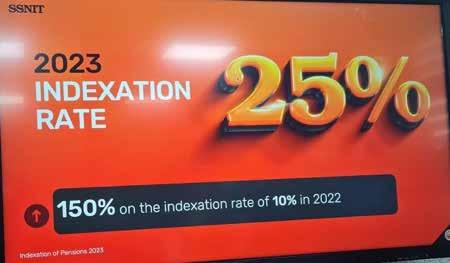
Redistribution is a mechanism applied to the rate (indexation rate) to cushion members on low pensions, in conformity with the solidarity principle of social securi-
ty.
By the increment, the minimum paid pensioner will receive GH¢430.58 while the highest paid pensioner receives GH¢169,725.89.
The Director-General of SSNIT, Dr John Ofori-Tenkorang, who announced this at a press conference in Accra today (January 13), said the projected expenditure on pensions only for 2023 will be GH 4.3 billion, GH 850 million more than last year.
He said, “the Trust remains committed to paying all legitimate bene ts accurately and timeously.”
By Eugene DavisBusinesses with potential to export, expand their markets, grow at an accelerated rate that can create employment are eligible to apply for government’s newly introduced SME High Growth Programme under the Ghana Economic Transformation Project (GETP), CEO of Ghana Enterprises Agency (GEA), Kosi Yankey-Ayeh has said.

The SME High Growth Programme is a Challenge Fund, funded by the World Bank and managed by the GEA, with the aim of the grant scheme to support productivity and competitiveness enhancing initiatives by high growth SMEs to acceler-
ate their growth.
Speaking with the media during the national launch of the SME Grant Programme in Accra on Wednesday, she said “We want to make the emphasis on technical assistance because more and more, we realise that people want the funding -but we don’t want it to be only focused on the funding because it does not solve the problem.
To be able to transform and accelerate growth, we need technical assistance, we are looking at people who are really committed to want to go through the technical assistance
programme to be able to transform and we take it to the next level.”
The SME High Growth Programme will target high growth SMEs across ICT, Agribusiness/Agro-processing, Education, Manufacturing, Food and Beverage, Textile and Garment, Construction, Tourism and Hospitality, Trade/Commerce of locally produced goods, Transport and Logistics, Healthcare or Pharmaceutical industries in Ghana.
Basis of Assessment Enterprises shall be de ned and di erentiated by these three key variables; employee size, annual sales/turnover amount, historical productivity, nancial growth and exports.
A business Tax Identi cation Number (TIN),Business Registration Certi cate or Certi cate of Incorporation, all shareholders and directors of the business must have and supply their Ghana Card Number, in lieu of which their Personal TIN must be supplied, nancial statements or income statement for the years 2019 to 2022.
All business owners must have valid
identity documents issued by a Ghanaian government authority such as passport or the Ghana card.
SMEs with majority Ghanaian shareholding (51percent or more) are eligible to apply to the SME High Growth Programme. Applying SMEs must be registered under Ghanaian law as a limited liability company, a partnership or sole trader and must be majority owned by a Ghanaian national.
The new SME High Growth Programme is designed to build on and consolidate the successes so far. It designed to provide training and capacity building necessary to lead to operational e ciency of the enterprises, boost their competitiveness and scale up their operations for further job creation.
Over GHS 65 million has been disbursed/committed to 800+ SMEs between September 2021 to December 2022.
Through this partnership a grant support of GHs160m equivalent of US$20m has been earmarked for the agship SME High Growth
Programme targeting SMEs nationwide, for general training, capacity upgrades, consulting, and nancing for selected and quali ed SMEs.
The Grant Programme’s support is expected help at 2000 SMEs to become investment ready (capable attracting both local and foreign capital into their business), increase sales and more importantly build their capacities to export and culminate into job creation and job sustainability.
The criteria for selection include, the entrepreneur must have majority Ghanaian shareholding (51% or more) in the business, must be registered under Ghanaian law as a limited liability company, a partnership, or sole trader.
Applicants are encouraged to read the detailed eligibility criteria to determine eligibility before applying, Small enterprises should demonstrate an employee size of 6 –30 and/or annual sales between GHS 180,000 – GHS 7.2m, Medium enterprises should demonstrate an employee size of 31 – 100 and annual sales between GHS 7.2M – GHS 21.6M.
A Deputy Trade and Industry Minister, Nana Ama Dokua Asiamah-Adjei who launched the programme, reiterated government’s commitment to fully implement all initiatives under the Ghana Economic Transformation Project, including the Grant Programme, for the full bene t of SMEs across the country.
“From the policy point of view, the Ministry of Trade and Industry will do the needful just as GEA will undertake the direct implementation of the GET Project in line with Government’s priority to support achieve economic transformation.

I like to admonish and encourage all bene ciaries to use every Cedi of grant received for the intended purposes. That way, I rmly believe without any doubts that SMEs will be able to grow and expand their operations with full gains. Whiles, Ghana at large and the citizenry bene ts most through jobs and wealth created, foreign exchange earned from value-added exports and much more.”
create a new entity that was di erent from them, was more powerful and better resourced than them, and could do business in its own name, develop its own goodwill, acquire its own credit etc?
England discovered, almost by accident, the arti cial person, ‘persona cta,’ as Sinibaldo Fieschi who became Pope Innocent IV, named it. It was at rst a Canon law principle meant to describe the relationships between the bishop and the church, and so separate their existence from each other.
By Ace Anan Ankomahworld, sell, and return to England with the money to be divided (dividend) among the ‘owners’ according to how much each of them invested (shares) in the venture.
So they would come together, pool resources, record what each brought to the table, set down the rules of the trade, acquire a royal charter, and then o the ship sails to Ghana!
business people are ‘necessity entrepreneurs,’ working just to
we’re missing out on that. Are we simply incapable of working together? Do we prefer ying solo? Then We are doomed.
So lemme get controversial. Where is the so-called ‘‘corporate Ghana,’ and can anyone show me any 5 indigenous Ghanaian-owned business in Ghana that have survived the lives of their founders or principals?
What I mean is that the single-owned businesses won’t take us anywhere. We are running glori ed ‘table top kingsway shops’ that only feed a family.
We don’t create the kind of unimaginable wealth that builds nations. For a start, the majority of our
On the ip side, and maybe what we need, are ‘opportunity entrepreneurs,’ people who understand how to gather the capital that competes with other capital and thereby build the kind of wealth that pushes a nation forward.
So I look back and ask: what businesses did our forefathers and mothers do? Farming? Fishing? Hunting? Trading?
Why did my grandpa and your grandpa have farms next to each other, and yet spent all the time ghting and litigating over the boundaries?
Why didn’t they sit, measure the lands, merge the lands and e orts to
But mercantile England borrowed the concept and applied it to the joint businesses they established, so that the joint business had a life of its own, which was separate from the venturers.
With that joint power, the mercantile class was soon gathering huge capital that any single operator could not have gathered on his own. With that wealth they could expand bigger and compete better. Slave missions (the downside of my theory) became the prime example of this new business model.
No single person has the nancial muscle to rent a ship, kit it for slave capture, hire men with guns, prepare food for them and 100s of poor souls, come to West Africa (mostly Ghana) and wait for months for the ‘cargo’ to arrive from inland, then sail all the way to the new
But these were single ventures that tended to wind up after each trip. Nevertheless, this concept of doing business through an ephemeral entity of joint resources that was considered a person, spread through Europe.
What it meant was that until pro ts are divided between the venturers either at the end of the venture or after an agreed period, the money of the business was and remained the money of the business. No one could dip his ngers into it at the end of the day to send his Secretary to buy him kenkey for dinner.
And all that you got was your portion of pro ts, and even that, after some of it has been ploughed back into the business so that the venturers didn’t always have to reinvest, but the entity would continue to feed them.
They distinguished between what
was SEED and what was FEED!
This business model didn’t really ride on trust or friendship, but a brutal enforcement of the agreed body of rules. It required written agreements at the start, which determined who brought what (shareholders), and who runs what (directors), and how the business is run, altogether becoming known as the memorandum and articles of incorporation.
Those rules were rigidly applied and taking money that hadn’t been ‘divided’ to you wasn’t just a breach of your duciary duties: it was treated as theft and you could go to jail for it!
That’s how the business entities survived even the lives of the principals, whose names literally took a back seat for the business to develop its own goodwill, grow, make wealth beyond their wildest dreams and pay taxes beyond the highest expectations of the countries.
When the principals died, the successors didn’t invade the entity’s o ce and distribute its assets as if the assets were part of the deceased’s estate. All the successors got, was the principal’s share of the business. The business remained.
Ghana? No so. Often the companies are formed only because the banks require it before you can open an account or obtain credit in the name of the business.
We mix corporate property and private property, with no distinctions between them. We run them like personal efdoms and chop all the money while at it. The son of the MD drives the company’s vehicle, at the cost of the company, when he’s not an employee.
The local business construct therefore lives on permanent life support, and dies with the principals. The accretion of capital that gives Pepsi the impudence, temerity and audacity to compete with
Coke doesn’t exist. Brands appear at the rst breath and disappear with the next intake of air.
So I ask, show me 5 indigenous Ghanaian-owned businesses that have survived the lives of their founders.
I could mention the names of such businesses that didn’t survive because they are a pesewa a dozen, and tell you how they collapsed with death; but I don’t know who I may o end here.
Until we understand that what sika doesn’t like, isn’t dede, but nkwasiasem, we aren’t ying.
The lack of serious business attitudes and the penchant for necessity-based entrepreneurship are why the waakye seller’s waakye runs out with 10 people in line waiting to give her precious money; and then she brags that her waakye is so nice that it runs out! Meanwhile what she probably needs is a business partner who has no such
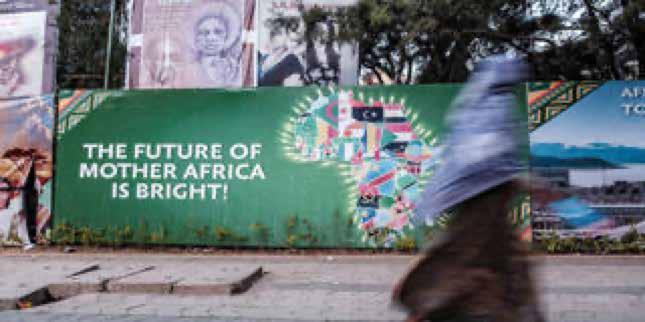
education, particularly in STEM (science, technology, engineering, mathematics) and digital skills, and seek partnerships with private-sector actors to expand access to information and communication services and
baseless emotional attachment to her waakye, and who will enforce strategy and measurement and projection.
‘What you measure is what you get. What you don’t, can’t or won’t measure is lost.’ That strict sense of measurement, is best expressed in enforcing a separation between the human and the business.
Until we learn to do business as business should be, and has been, done everywhere else but here, we will have the small-small businesses that give us little beyond personal comfort, feed our families, send the kids to school abroad from where they don’t return, and when daddy and mummy die, they will come and sell the house, share the money and return to invest that money abroad where they now have a life!
My mouth has fallen.
They call me Ace © 2023
By Landry Signélike the AU’s Development Agency must be given the resources and authority they need to ful ll their mission.
The past year has been challenging for Africa. After a hopeful 2021, during which the continent-wide GDP increased by nearly 7% and every region experienced real growth, the economy slowed in 2022 amid rising in ation, monetary tightening, and geopolitical tensions. But it was also a year when African countries were nally able to make their voices heard on the global stage. At the start of another critical year, with the continent’s GDP projected to increase at a relatively modest pace of 4.1%, governments can take several steps to boost economic activity and ensure a sustainable future.
For starters, policymakers must foster trade and investment through the African Continental Free Trade Area (AfCFTA). Under a fully implemented AfCFTA, Africa’s combined consumer and business spending is expected to reach $6.7 trillion by 2030 and $16.12 trillion by 2050, transforming value chains and potentially reducing poverty across the continent.
Eight countries – Cameroon, Egypt, Ghana, Kenya, Mauritius, Rwanda, Tanzania, and Tunisia – began
trading under AfCFTA’s Guided Trade Initiative last year. To build on this momentum in 2023, policymakers must accelerate the implementation of the agreement’s next phases, improve intra-African coordination, and call attention to early successes. Moreover, eliminating non-tari barriers by introducing reporting and monitoring mechanisms would reduce business costs and encourage countries to increase imports.
Policymakers should also rely more on Fourth Industrial Revolution (4IR) technologies like arti cial intelligence and cloud computing to create new value chains and strengthen economic resilience. To realize the transformative potential of these tools, political leaders must honor the infrastructure commitments they made at the African Union’s 2022 summit on industrialization and economic diversi cation. Policymakers should also consider investing in strategically important industries, such as pharmaceuticals, agriculture and agro-processing, the automotive sector, and logistics. Sub-Saharan governments must also invest in
At the same time, because Africa’s economic future hinges importantly on its ability to rede ne its global status, governments must build on recent diplomatic breakthroughs. In the past few years, African governments have assumed a more prominent international role, presenting a united front in multilateral climate negotiations. US President Joe Biden has called for the AU to become a permanent member of the G20, which would help solidify the AU’s position as the world’s top agriculture negotiating group. Agreeing on a shared agenda would enable African leaders to secure funding for sustainability-related projects and hold the United States, China, and the European Union to their promises.
Given the impact of the COVID-19 pandemic, rising in ation, and climate change on income and wealth disparities across Africa, concerted action is becoming all the more important. Without it, the United Nations estimates that at least 492 million Africans will be pushed into extreme poverty by 2030, and at least 350 million will remain extremely poor in 2050. Moreover, despite recent progress toward gender equality in educational opportunities and political representation, African women are still more likely to live below the international poverty line, experience severe food insecurity, and leave the labor force to perform care work.
To achieve the UN Sustainable Development Goals, African countries must focus on providing quality education, health care, and job-creation programs that leave no one behind, particularly women and young people. African development agencies
Such capacity building will, however, require African governments to address institutional decay. As Freedom House’s annual Freedom in the World report shows, 2022 was the 16th consecutive year of global democratic decline, and Africa is no exception. If allowed to persist, political instability, corruption, and lack of accountability can undermine even perfect policies.
By working with partners and using evidence-based methodologies to monitor projects, assist in implementation, and guide decision-making, African countries could bridge the gap between policy goals and outcomes.
Lastly, ensuring a fair and sustainable green transition remains the most pressing issue facing Africa, the most climate-vulnerable continent. While African countries would need $2.8 trillion by 2030 to meet the emissions targets set by the 2015 Paris agreement, Africa’s annual in ows of climate nance currently amount to only $30 billion. But governments can and must build on the momentum generated by the UN Climate Change Conference (COP27) in Egypt, which resulted in a groundbreaking decision to create a “loss and damage” fund to help developing countries mitigate the worst e ects of climate change. Policymakers could mobilize such resources to invest in adaptation e orts and renewable energy.
African leaders must use this moment to accelerate the continent’s shift to a carbon-neutral economy. In what is sure to be a pivotal year for climate-change action, Africa can and must make signi cant progress toward a more equitable, sustainable, and resilient future.
 By Jim O’Neill
By Jim O’Neill
Although it has been almost a decade since I gave up a full-time job in nance, markets – and market oddities – still fascinate me, especially when they send signals that run against a widely held consensus among analysts and investors. Given all the disappointments in 2022, the outlook for the new year is quite downbeat. Major corporations are announcing layo s, and the International Monetary Fund is forecasting that at least one in three countries will experience a recession this year.
The reasons for such pessimism are not hard to nd. The big in ationary surprises of 2022 triggered a massive and rapid tightening of monetary policies in most major economies, and key central banks have continued to talk tough.
Although the US Federal Reserve reduced the size of its interest-rate hikes from 75 basis points to 50 bps in December, it has made clear that more rate hikes are likely – and that a rate cut is not in the cards for 2023. Making matters worse, many other problems, like Russia’s war in Ukraine, continue to simmer,
threatening supply chains, markets, and economies around the world.
At some point in my career, I was introduced to an old almanac that o ered an endless array of heuristics about US stock markets’ past performance. One nugget that always stuck with me is the ve-day rule: If the S&P 500 index makes a net gain during the rst ve trading days of the calendar year, equities will perform well for the year overall. When I asked my colleagues to check it for the 1950-2014 period, they found that it held true more than 80% of the time.
Well, in the rst ve days of 2023, the market rose by just over 1%, which means there is over an 80% chance that it will be positive on the year – at least according to the ve-day rule. But before you rush to buy your favorite stocks, let me add a few obvious caveats. First, the stock market tends to rise more than it falls: down years are nowhere close to as frequent as up years. This is not particularly surprising, considering the prominent role that equity markets play in nance.
Second, the ve-day rule is not airtight. There is almost a 20% chance that a rising market during the rst ve trading days ends up being down on the year. Ultimately, economic conditions, not some hoary heuristic, will determine the outcome. After all, why should the rst ve days be determinative of anything? It is understandable that many retail and institutional investors would want to signal con dence for the year, but there is no underlying economic reason why this period should be considered especially predictive.
Nevertheless, other recent developments o er some cause for hope. Commentators may soon change their tune, and that could make investors more open to embracing a di erent collective narrative than the one that has been in uencing their behavior so far. I can see three reasons why that could happen. First, despite the war in Ukraine, many commodity prices – including natural gas – fell signi cantly in the second half of 2022. That not only increases the probability that in ationary pressures will ease; it also means that companies and consum-
ers’ disposable income is not as vulnerable as was previously assumed. Equally important, several high-frequency indicators for late 2022 and early 2023 have been better than expected, notably in Europe.
Second, other in ation indicators have also been better than expected on both sides of the Atlantic, including the most recent US wage-data series. While the Fed and many other central banks insist that they will remain hawkish, I am reminded of something a famously successful US hedge fund manager once told me: The only thing you can know about the Fed is that it will change its message when the evidence changes. If the in ation picture continues to improve faster than Fed o cials expect, they will change their view.
Finally, one must not forget China, which suddenly abandoned its zero-COVID policy in December. Notwithstanding the massive surge in infections and hospitalizations, the end of lockdowns sets the stage for a big cyclical bounce in the Chinese economy – even with all the other structural challenges that Chinese authorities must confront. Recall that there was a similar post-lockdown rebound in many other countries (even the United Kingdom, despite all its other problems).
Investors will seek further clues in what happens next. If markets manage to remain slightly more bullish through the end of the month, I suspect many commentators’ views will also shift. Then it will be time to consider whether things are really looking up – or whether the ve-day rule is best ignored.

regional organizations, dispatched 38 medical expert teams to 34 countries and has provided hundreds of billions of pandemic control supplies to 153 countries and 15 international organizations and provided over 2.2 billion doses of COVID-19 vaccines to over 120 countries and international organizations. The UN Secretary-General Antonio Guterres expressed thanks to China for its important contributions to the international cooperation in ghting the COVID-19 pandemic, especially in achieving a fair distribution of COVID-19 vaccines in developing countries.
Adjusting and Optimizing COVID-19 Policies
Over the past three years, the COVID-19 pandemic has wreaked havoc around the globe and posed enormous challenges to all countries including China. The Communist Party of China and the Chinese government, putting the people and their lives rst, have made every e ort to protect the lives, safety and health of the Chinese people. Though China accounts for 18.32% of the world's population, its total COVID-19 deaths are equivalent to 0.08% as of the worldwide.
e ectively responded to ve global COVID waves and avoided widespread infections with the original strain and the Delta variant. The life expectancy in China has increased steadily, with the average lifespan rising from 77.93 years in 2020 to 78.2 years in 2021. China was the only major economy to achieve positive growth in 2020. Its total economic output exceeded 17 trillion US Dollars in 2021 and accounted for 18.5% of the world economy.
businesses operating across the economic sectors will be explored in a forthcoming report by the global research and advisory company Oxford Business Group (OBG).
The Report: Ghana 2023 will shine a spotlight on the wide-ranging tax reforms under way, which form a key part of broader e orts to boost revenue and bring about scal consolidation.
Focal points will include the newly introduced e-levy, nancial sector recovery levy, energy sector levy and Covid-19 recovery levy, alongside other key developments, such as the implementation of tax identication numbers.
orandum
Since the COVID-19 outbreak, China, upholding the vision of building a community with a shared future for mankind, has made signi cant contribution to protect global public health. China shared the genome sequence of the virus at the earliest opportunity, making important contribution to the drug and vaccine research and development in countries around the world. We shared pandemic control and treatment information with over 180 countries and more than 10 international and
The MoU was signed by Ramona Tarta, OBG’s Country Director for Ghana, and Ayesha Bedwei Ibe, Tax Leader, PwC Ghana and PwC Global Tax and Legal Services People Leader.
Commenting after the signing, Ibe said that OBG’s forthcoming report would be a valuable research tool for investors eyeing Ghana’s potential, coming against a changing business landscape marked by ambitious
country moving to introduce policies and reforms aimed at ensuring new growth is sustainable and more inclusive.
In the light of the marked decline of the pathogenicity and virulence in Omicron and the steady rise of China’s capacity for medical treatment, pathogen detection and vaccination, China has re ned its COVID-19 response measures, shifting focus from stemming infection to protecting health and preventing severe cases. According to the recently released Notice on Provisional Measures on Cross-border Travel, starting from January 8, 2023, inbound travelers will no longer conduct nucleic acid testing on arrival, outbound travel of
“Ghana is taking steps to restore macroeconomic stability and boost GDP in the recovery phase, which is key to instilling investor con dence and increasing in ows,” Tarta said. “PwC Ghana has long been instrumental in supporting a wide range of businesses looking to establish themselves and expand their presence in the country, combining in-depth knowledge of changes to the local tax and scal environment with the bene ts of a global professional resource base. I’m thrilled that our analysists and, in turn, the international investment community will continue to benet from their expertise in analysing this important market.”
The Report: Ghana 2023 mark the culmination of than a year of eld research team of analysts from Oxford Business Group. It will be a guide to the many facets of country, including its macroeco nomics, infrastructure, banking and other sectoral develop ments. OBG’s publication also contain contributions leading representatives across the public and private sectors.
The Report: Ghana 2023 will available online and in print. will form part of a series tailored studies that OBG currently producing with partners, alongside other highly relevant, go-to research including ESG and Future Readi ness reports, country-speci
Chinese citizens will resume in an orderly manner. The purpose is to better coordinate COVID-19 response with economic and social development, and ensure the normalcy of people’s life and work. All countries go through a period of adaptation when shifting gear in their COVID-19 policies and China is no exception. China’s COVID-19 policy adjustment is science-based, timely and necessary. The ght against COVID-19 in the past three years has laid the foundation and created necessary conditions for the latest round of policy adjustment. Relevant Chinese authorities have shared the genome data of the virus from COVID cases in China via the Global Initiative on Sharing Avian In uenza Data (GISAID). China will continue to closely monitor the mutation of the virus, release epidemic information in a timely, open and transparent manner in accordance with the law, and work with the international
community to meet the challenges of the epidemic. The overall COVID-19 situation in China is within expectation and under control. We are condent that we will have an accelerated return of normal economic and social life and secure a complete and nal victory against COVID-19.

Reinvigorate the World Economy China’s latest policy adjustment will create new conditions for stronger international exchanges and cooperation. As the economic recovery gathers steam after China continues to re ne COVID-19 policies, China's adjustment of its strategy has been well-received and supported by the international society. Foreign rms hold optimistic expectations for their performance in the Chinese market in the coming year. The WHO is pleased to see China loosening some of its COVID-19 restrictions. Foreign business communities in China, including the European Union Chamber of Commerce in China, are
optimistic about China's recovery as they see the ability to revive from hurdles is rooted in the nation's culture. A senior executive of Henkel stated that the continuous optimization of pandemic control measures in China speaks to China's commitments to safeguard economic and social development amid the pandemic. A representative from the China-Britain Business Council said China's decision to ease border restrictions is extremely welcomed. Tourist destinations across the world can't wait to welcome Chinese tourists as cross-border travel searches soar in China. According to J.P. Morgan Asset Management's forecast, China's GDP growth may rebound to over 5 percent in 2023.
China and Ghana Fighting the COVID Together China attaches great importance to medical and health cooperation with Ghana, and has sent eleven
medical expert teams to Ghana, making great contributions in helping Ghana ght against malaria, AIDS, cholera and typhoid. After the COVID -19 outbreak, China sent a charted ight to deliver medical supplies to Africa via Ghana. The adjustment of China’s COVID response measures provides new opportunities for closer economic and cultural exchanges between the two countries . We will continue to pull together with Ghana in the trying times, and deepen cooperation with Ghana in the eld of medical and health. We are con dent that economic, trade and people-to-people exchanges and cooperation will become even closer and robust in the coming days.
The global pandemic is not yet over. China stands ready to make concerted e orts with the rest of the world to ght the pandemic together and protect the health and safety of the people, promote world peace and
eco-friendly, and 50 times cheaper compared to the conventional concrete house. Now is the time for us as Ghanaians and Africans at large to embrace these innovations reinvented by 66 Engineering to build that enviable motherland of African states for ourselves and posterity.
By this publication, we are therefore calling on all stakeholders in the building, construction and real estate industry, all governments in the African continent, regulatory bodies, civil society
3 | P a g e
Will the a ordable housing dream ever materialized in Ghana where several attempts to build a ordable housing units for citizens of the state failed for decades? The evidence is so glaring as we keep recording huge housing and infrastructure de cits at every population census conducted since independence. The Ghana Population and Housing Census 2021 reported a housing de cit of about 1.8million. The ripple e ect is what we see today, the dramatic increase in slum communities, unapproved settlements, and substandard residential structures across major cities in Ghana particularly Accra. The state tried to change the trajectory, so did the private sector to bridge this ever-widening de cit but all to no avail.
The good news however bad the situation may be today is that, 66 Engineering Ltd has reinvented the science, art and engineering of building standard residential houses that cost less than Ghs 60,000 in the capital city Accra, and even much more less in the other regions across the country. 2 |
At 66 Engineering, we provide our clients with several alternatives and opportunities of building standard yet building cheaper residential homes that every Ghanaian can a ord irrespective of one’s income level or class of society.
The project in picture in this publication is one of our projects in Accra that has become the cynosure of all eyes for the past few weeks we erected this structure. This is one of our interlocking brick’s cheaper building solutions. The bricks by designed have two (2) round holes and a small rectangular perforation in the middle. These holes are purposely for mortar joints and in some cases serves as conduits for plumbing pipes, electrical cable pipes, bamboo or iron reinforcement. Remember the technology is not the conventional clayed red bricks that have been in the system that we all know. This technology is in the family of the stabilized compressed earth. It is a ratio of cement, clay or laterite, in some cases giving us a brick with average compressive strength of 8Mpa far higher than the average industry compressive strength
requirements of a concrete block.


The structure does not require plastering after building, no painting, (you can only polish it if only you want to brighten or give it di erent color designs). Color of the house can be kept consciously by a selective choice of the clay or laterite or a mixture of the two, the building maintains an environmentally friendly temperature that there will be no need to spend a dime on air conditioner installation and the electricity to power them. Alternatively, one can garnish this structure with natural stone décor marbles to give it that luxurious taste.
The interior can be plastered depending on the taste and preference of the individual, or better still be sealed and polished with a special varnish cheaper than plastering and painting. Ceiling and lamp holders can be processed bamboo which is a local content input and environmentally friendly as well. Roo ng can be locally made asbestos roo ng slates common in the market, oor can be bamboo tiles et cetera ect cetera.
The reality is that, you end up having a complete house with sound and superiorstructural integrity,
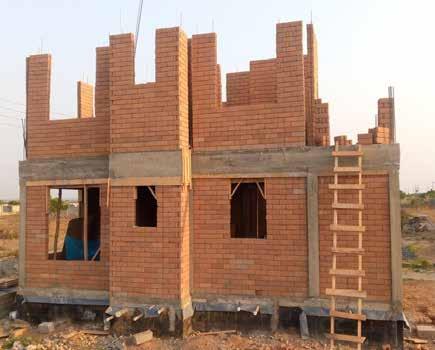
organizations, international and regional associations, non-governmental organizations et cetera to rally behind this clarion call by patronizing these innovations reinvented by this young company (66 Engineering Ltd), and also spreading the good news across the length and breadth of Africa. We are also appealing to all international bodies such as the World Bank, International Finance Corporation (IFC) through the EDGE initiative, the ECOWAS community, African Union, the African Continental Free Trade Area Secretariate for partnerships, investors, in uencers etc so that 66 Engineering can do mass production of these GREEN BUILDING TECHNOLOGY housing in gated estate communities to put shelter over the heads of the homeless majority of African people in our homeland Africa. You can reach us on: www.66engineering.com or send us a mail via 66engineeringgh@gmail.com for further information. Remember that the future is always built today and not tomorrow. Imagination is our hallmark at 66 Engineering. Do not sit on the fence, join the revolution now!. 66 Engineering: Bringing Imagination to Reality!
Writer: DANIEL KONTIE
Position: Managing Director (66 Engineering Ltd)
Contact: +233209032280


F3*!,9!FE9:)!%.-*%2-@!0.1/0!K<)3*)!J(-::-3<!<)-30 !"2)?"6996.=)%,$2.=,"2.2&)'='6.%,),"2)&399'$A),$'&6.=)',)0GDB)5$3<)0Q*0)',)9'%,)F22;8%) 793%2A)'%)a='.&')'.&),"2)M3$9&)b2'9,")c$='.6d',63.)&279'$2&)'.)2.&),3),"2) 73#.,$(8%)L:39')2C6&2<67)'5,2$)'9<3%,)53#$)<3.,"%>)K3).2F)6.527,63.%)"'H2):22.) &2,27,2&)53$)<3$2),"'.)J+)&'(% &3#:92),"2)6.7#:',63.)C2$63&)53$),"2)H6$#%>) a='.&'8%)F3$%,)L:39')3#,:$2';)6.)<3$2),"'.),F3)&27'&2%)$2%#9,2&)6.)*J0)7'%2%)'.&) BB)&2',"%>)M2)2UC27,)5#$,"2$)='6.%)53$),"2)?"6996.=)6.),"2).2'$),2$<>
three pharmaceuticals GSK, Johnson & Johnson AstraZeneca report shows that more pharmaceuticals are moving to access to medicines Access to Medicine ranked the top 20 pharmaceutical companies globJohnson & Johnson and AstraZeneca took the top three in the list.

AstraZeneca’s top three position 2022 Access to Medicine (AtMI) re ects the compaleading work to strengthen health systems, as well as equitable and a ordable access to life-changing

treatments.
Pascal Soriot, Chief Executive O cer, AstraZeneca, said: "We believe it’s vital everyone has access to a ordable, sustainable, and innovative healthcare, particularly in low- and middle-income countries. This ranking re ects AstraZeneca’s strategic focus on improving access to medicines and to the crucial work with our partners to strengthen health system resilience.”
dle-income countries (LMICs). It focuses on three technical areas: Governance of Access; Research and Development (R&D); and Product Delivery. AstraZeneca moved up from 7th to 3rd position after performing well across all three technical areas.
fers, was also highlighted as key to ensuring continuous supply of medicines in LMICs. Furthermore, the AtMI recognised AstraZeneca’s local capacity building initiatives and use of inclusive business models aimed at meeting the access needs of populations at the base of the income pyramid.
L)3M)3-)3!J(-::-3<!0,)E:%!13*%/!3%8!@%3,/):!E)3&!:%)*%/0(-. !"2)?"6996.=)F'%)%,2'&()'='6.%,),"2)&399'$A),$'&6.=)',)+00B 6.)96.2)F6,")9'%,)F22;8%) 793%2)'.&)"'9,6.=)')%"3$, 96H2&)F2';2.6.=),$2.&>)!"2)=3H2$.<2.,)"'%)'CC36.,2&) 53$<2$)56.'.72)<6.6%,$()355676'9)L<<'.#29)!#,#:')'%),"2)73#.,$(8% .2F)72.,$'9):'.;) =3H2$.3$A)$2C9'76.=)S93$2.%)@#3=')',),"2)2.&)35)"6%),2$<>)!'.d'.6'8%)6.59',63.)$',2) 2'%2&)%96=",9()6.)R272<:2$A)5'996.=),3)J>DE)5$3<)J>IE)6.)K3H2<:2$)'<6&)%93F6.=) 273.3<67)'7,6H6,(>)!"6$&)Z#'$,2$)NR1)=$3F,")%96CC2&),3)B>+E)5$3<)B>BE)53$),"2)%'<2) C2$63&)')(2'$)2'$962$>)V$3C)C$3,63.)=$3F,")5299),3)+>QE)5$3<)G>DE)')(2'$)2'$962$A) '9,"3#=")$2H2.#2)F'%)%#CC3$,2&):()533&)C$672)6.7$2'%2%)'<6&)2UC3$,)&2<'.&)5$3<) .26=":3#$6.=)73#.,$62%>)M2)2UC27,),"2)?"6996.=),3)$2<'6.)%,':92)',)'$3#.&),"2)+00B) 92H29)6.),"2)F22;)'"2'&)'%),"2)73#.,$()%22;%),3)73.,$39)6.59',63.'$()C$2%%#$2%):() 2'%6.=)6.,2$.',63.'9),$'&2):'$$62$%>

AtMI is an independent ranking of 20 of the world’s largest pharmaceutical companies and evaluates their impact on improving access to medicine in low- and mid-
AstraZeneca was recognised by AtMI as the industry leader in Product Delivery, noting its application of tailored access strategies for di erent countries re ecting their income classi cations across all product categories. The Company’s approach to patent transparency and sharing of intellectual property assets, using technology trans-
AstraZeneca also performed well in the Governance of Access category re ecting robust compliance controls, and also in R&D for its access plans for projects in Phase 2 or 3 of clinical development. Ongoing company initiatives to support access to COVID-19 vaccines via manufacturing, procurement, and distribution agreements in the light of the pandemic were also recognised.
fJJ)+/)0JQD)IQ*/
Read more about the delivery of AstraZeneca’s Access to healthcare commitments in the 2021 Sustainability Report and Sustainability Data Summary.


Sika Mpε Dede, the maxim by the President has quickly metamorphosed into many things. From t-shirts to music and now, a book. The masterpiece authored by Certi ed Financial Fitness Coach; Peter Kwadwo Asare Nyarko & Certi ed Professional Trainer (CPT); Samuel Agyeman-Prempeh is an eye-opener on many salient money conversations.
Launched at the WestLionCo premises on the 25th of November 2022, it was well attended by patrons who thronged the place. Preceding the book launch was the Start-up Dialogue which saw experts in their various elds such as Ethel Anne Komlaga of Enterprise Bureau, Peter Kwadwo Asare of Center for Financial Literacy Education (CFLE Africa), Paul Frimpong of WestLionCo and Samuel Agyeman-Prempeh of Role Model Africa headlining the
event.
Ethel Anne Komlaga who spoke on Entrepreneurship and Funding expounded the need for entrepreneurship in these uncertain economic crises. She explained the need for each entrepreneur to discover their makeup and use that to their advantage. She gave wonderful insights on how to position oneself for funding. In her words, “there is a lot of money for funding”. All one needs to do is to identify the many sources of funds available.
Peter Kwadwo Asare Nyarko, Executive Director for the Center for Financial Literacy Education (CFLE Africa) and co-author of Sika Mpε Dede engaged participants with priceless nuggets on nancial planning. He broke down the complexities of money and the need for everyone to be nancially independent. He said, “everyone
must know the 5Ms of money. The Meaning of money, The Making of money, How to Manage it, How to Multiply and Move it”. He believes these pillars shape one’s nancial trajectory.
Paul Frimpong of WestLionCo spoke on investments. Explaining the intricate details of investments especially in these times, he gave a detailed breakdown of the everyday nancial jargons hurled at us by the experts. He explained that, “risk is closely tied to investment”. He asked all potential investors to read more before making any investment decisions.
The climax of the session enchanted participants with a delivery by co-author of the masterpiece, Samuel Agyeman-Prempeh sharing his perspective on the all-important subject of juggling between a day job and a side hustle. Broaching the topic which has become a favorite of many, both in the formal and informal sector, the IAPPD Certied Professional Trainer (CPT) engaged participants on the need for side hustles to become much more than something we do for survival. “We need to run our
businesses so well that they function with e ective systems and process, he highlighted. Mr. Agyeman-Prempeh emphasized the need for entrepreneurs to disintegrate themselves understand all aspects of the business but very importantly trust and work with team mates and partners as that serves as a catalyst for the growth of the business. The event rounded up with the launch of what is potentially a bestseller ‘Sika Mpε Dede’. The book speaks on the many silent topics regarding money and its usage in our society and the world at large. A great companion to the student confused about money to the trader who seeks to make the most of his money to the investor who is in a dilemma on what to do in these times.
Peter Kwadwo Asare Nyarko and Samuel Agyeman-Prempeh’s ‘Sika Mpε Dede’ is a light for all in these challenging nancial times.
Published by Lumière Creatif, the book is available on Amazon, Sayda, Booknook and Selar.
!2++2#"*/&+$0.(*
IE4*6@!7M-M*4G!7+*!:*M;4!+?>$!*47?E4;!Q*+;M:-G!5E;!
E5-M*5>!65G!Q>MWW4-4;!?E!-.4!E4,!@45*!5G!-*5;4*G!
*4:+EG?;4*4;!E45* -4*W!,+**?4G!+34*!:+>;!
,45-.4*!5E;!745*G!+7!GMQQ>@!G.+*-564G!5E;!

;MWQ4;!:+E-*5:-G =*4E-!7M-M*4G!-*5;4;!55!F5**4>$!:+WQ5*4;!-+!bPcL8/0X 5-!,44C!


?E6 ,a, 5E;

G:5>4;!MQ!-+ E45*!G434E W+E-.!.?6.G$! 5G!W+;4*5-?E6!b/P/!9+FG!6*+,-.!G?6E5>4;!W+*4!
G>+,?E6!+7!*5-4!.?C4G!F@!-.4!\4;4*5>!A4G4*34 '+>;
bPcX$LR0/<&$ 7*+W bPcX$L#8/L& >5G-! *47>4:-?E6!,a, 65?E 5E; [J( 5QQ*4:?5-?+EG %/#L1!*4GQ4:-?34>@ J.4!Q*?:4!+7!Y+:+5! *4:+*;4; 5E!?E:*45G4 7+* -.4! .4!:+WW+;?-@ -*5;4; 5- bPc%$R&8/&&! Q4*! +E!\*?;5@$

;475M>-!+*!5*4!3M>E4*5F>4!-+!+-.4*!5;34*G4!:*4;?-! 434E-G/!J.4G4!F+E;G!5*4!5--*5:-?34!-+!?E34G-+*G! F4:5MG4!;4GQ?-4!-.4!*?GC!-.4@!-@Q?:5>>@!Q5@!WM:.! .?6.4*!@?4>;G!-.5E!F4--4*!gM5>?-@!F+E;G/

Huawei has earned a top rank from CDP for its actions on climate change and transparency of disclosures. The international environmental non-pro t organisation placed the company among its Climate change “A List”, the only rm from mainland China to get the accolade. CDP also granted Huawei an “Excellent Environmental Leadership Award”.

Huawei included in the 2022 CDP Climate Change “A list”
Huawei adheres to the concept of "Tech for a Better Planet", meaning to use technology to foster green development and combat climate change. ICT technologies, Huawei believes, are powerful tools for reducing carbon emissions, promoting renewable energy, contributing to a circular economy, and protecting nature.
In its own operations, Huawei
strives to promote energy conservation and emission reduction, as well as to use more renewable energy.
Meanwhile, our Digital Power business focuses on areas such as –clean power generation, electri cation of transport, and green ICT infrastructure – to facilitate global energy transition.
By the end of 2022, Huawei has helped its customers generate over 695.1 billion kWh of green power, and reduce customers’ power consumption by 19.5 billion kWh, equivalent to avoiding nearly 340 million tons of CO2 emissions.
In addition, Huawei incorporates the concept of circular economy into its product life cycle management, from product design to end of service life. We are committed to using more eco-friendly materials and greener packaging, lowering carbon emissions in our processes,
and producing more durable products that reduce waste.
To complement our own e orts, we work with partners such as environmental protection organizations and scienti c research institutions, to harness technology in innovative ways to protect forests, wetlands, oceans, and nature as a whole.
Tao Jingwen, Director of the Board and Director of the Corporate Sustainable Development Committee for Huawei, said: "Sustainable development is an important part of Huawei's overall strategy. To address the global challenge of climate change, we believe that technology is a key enabler of sustainable development, to create a more inclusive and environmentally-friendly world. Huawei hopes to work with global customers, suppliers, and partners to promote green
and sustainable development in various industries and build a low-carbon society."
Dexter Galvin, Global Director of Corporations and Supply Chains at CDP, congratulated Huawei for its performance. He said: “Environmental transparency is the rst vital step towards a net-zero and nature-positive future. In a year of ever-increasing environmental concerns around the world – from extreme weather to unprecedented losses to nature – the need for transformational, urgent and collaborative change is more critical than ever.”
Galvin continued: “As CDP continues to raise the bar on what quali es as climate, forests and water leadership, we hope to see the ambitions and actions of companies on the A List – and those wanting a place on it – do the same.”